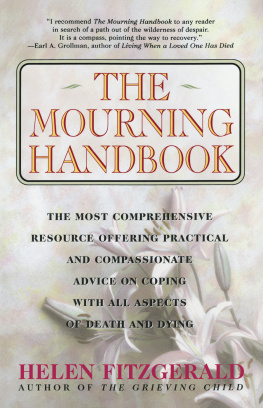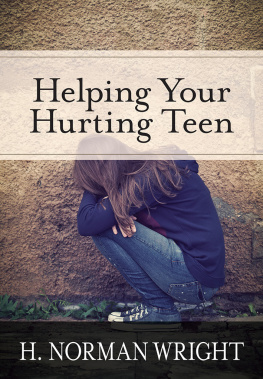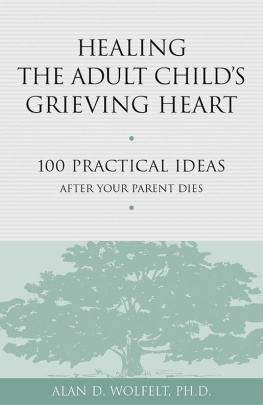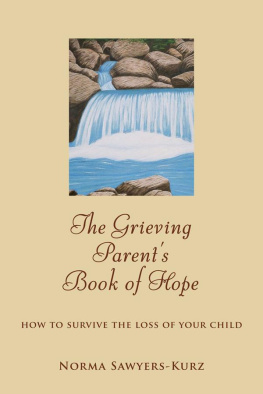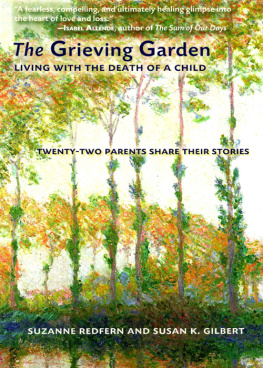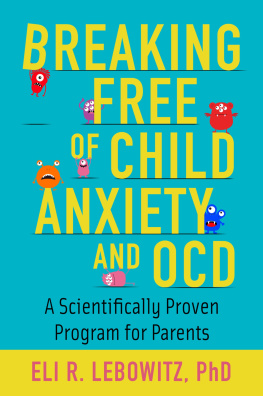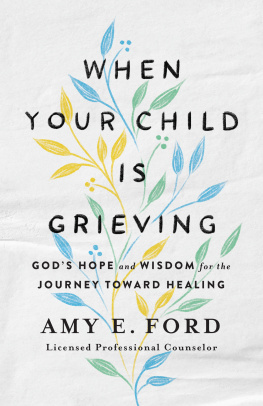We hope you enjoyed reading this Touchstone eBook.
Join our mailing list and get updates on new releases, deals, bonus content and other great books from Touchstone and Simon & Schuster.
C LICK H ERE T O S IGN U P
or visit us online to sign up at
eBookNews.SimonandSchuster.com
Thank you for downloading this Touchstone eBook.
Join our mailing list and get updates on new releases, deals, bonus content and other great books from Touchstone and Simon & Schuster.
C LICK H ERE T O S IGN U P
or visit us online to sign up at
eBookNews.SimonandSchuster.com
Contents

This book is dedicated to my second husband, Richard Olson, whose expert guidance and loving support gave me what I needed to write it, and to all the wonderful children who have come into my life bearing the burden of great losses, sadness, and distress. They have been my teachers, without whom this book could not have been written.
Acknowledgments

P ublication of this book provides me an opportunity to thank the many people who made it possible for me to become the director of a grief program, lecturer, death educator, and, now, an author. In the difficult period before and after the death of my first husband I had wonderful support from doctors and colleagues at Fairfax Hospital in Falls Church, Virginia, where I worked as a creative therapist. One of these was Doris Herring, R.N., M.Ed., who served as a sounding board for my many frustrations. Another was Barbara (Cookie) Kerxton, B.A., my fellow creative therapist whose sense of humor helped preserve my sanity. And it was a social worker, Eileen Pearlman, who made me aware of a newly formed national support group for persons with life-threatening illness; it was called Make Today Count. She and I formed the third chapter of that organization. Later I began offering my services as a volunteer to work with cancer patients, thanks to the support and encouragement of Richard Binder, M.D., an oncologist. Bill Jacobs, an administrator at Fairfax, also gave me strong support, including the assistance of the hospital in providing me professional supervision by my teacher and mentor, Mila Tecala, L.C.S.W., who was already becoming known for her work with dying patients.
Others who helped me get started were Peter Bloom, Ph.D., a psychologist who became my co-leader of Make Today Count; Lee Wick, M.A., then director of Prevention and Early Intervention at the Mount Vernon Center for Community Mental Health in Alexandria, Virginia, who hired me to direct the centers grief program; Shirley Costello, Ph.D., director of the center, who supported that decision and my program for eleven years before her retirement; Dan Leviton, Ph.D., professor of health education at the University of Maryland, who gave me my first lecture opportunity and who has encouraged me in my career ever since; Elisabeth Kbler-Ross, M.D., whose advice and counsel have been very important to me; numerous colleagues in the Association for Death Education and Counseling; and many other friends and associates whom I would mention but for the limitations of space.
I also want to thank my childrenPatti Ann, Sarah, Chuck, and Maryfor exceptional patience and understanding during those tough early years as I was developing my career.
Finally, I want to acknowledge the contributions of my literary agent, Anne Edelstein, and my editors, Tony Sciarra and Sheridan Hay, who held my hand and guided me though the completion of this book.
Introduction

E very year hundreds of thousands of children in the United States and millions throughout the world experience the death of a parent, grandparent, or other close relative, shattering their seemingly secure worlds. All too often their surviving parents, preoccupied with their own grief but thinking they are doing the right thing, hide their true feelings, tell their children little or nothing about what has happened, leave them out of all serious family discussions, send them away at the time of the funeral, and somehow manage to ignore their childrens need to grieve the losses that have so drastically altered their lives.
There is nothing evil about the way these adults neglect the emotional needs of their children; it is just that they dont know, or have never given thought to, the emotional impact that the death of a parent or other close relative can have on a child. If they knew, they would not allow a childs fantasies to cloud reality or a childs anger to lead to destructive acts. If they knew, they would not allow a childs unresolved grief to continue into adulthood, imposing a burden of anguish for as long as a lifetime.
Even though many adults now understand something about the process of grief, this way of dealing with childrens grief is still altogether too common. And the only way to alter this pattern is for people to become aware of the tremendous importance of being truthful, open, and caring, the importance of allowing children to ask questions and confirm the reality confronting them, the importance of allowing them to go through the painful but therapeutic process of grief.
Some years ago Helen Fitzgerald, whom I met when her first husband was dying of cancer, began a pioneering experiment in her role as Director of the Grief Program at the Mount Vernon Center for Community Mental Health in Alexandria, Virginia. Designed for young children who have suffered great, often traumatic, losses such as suicide deaths and murders, her experiment combined death education with the idea of a support group, previously considered inappropriate for young children. Its success, attested to by the teachers and parents of these troubled children, has broken new ground in the mental health field.
In the course of this work Ms. Fitzgerald became aware of the need for a parents guide that could be a kind of primer for parents in helping their children through the process of grief. This book was written to fill that need. It begins with cases of adults who have carried unresolved grief from their childhood and goes on to address in detail the many things parents can do to help children with their grief, thus avoiding such a fate.
I commend The Grieving Child to every parent, either to help a child grieving the death of a loved one or to help prepare the parent and child for losses that are yet to come. Mortal as we all are, they will come.
Elisabeth Kbler-Ross, M.D.
Headwaters, Virgina
March, 1990
Foreword to the Second Edition

W hen I sat down to write The Grieving Child some years ago, I had been working with grieving children individually and in groups for about ten years. Their ages ranged from six to twelve. The book was based on what I had learned about how elementary-age children grieve and how they can help one another in a group setting. The groups I conducted during those years were among the first ever undertaken for children in this age range, blazing a trail as it became clear that children suffering great personal losses can be helped by sharing their grief with others.
At that time, however, very little was known about the grieving process in preschool children. Was it possible that such young children could understand the meaning of death? Was it even desirable to present them with the truth, or should they be protected from such harsh reality? Since those were the same questions asked earlier about their older brothers and sisters, it seemed to me that I should give it a try. I spoke with the parents of several preschool children and formed my first Little Peoples Group. That was several years ago now, and like the groups for older children, it blazed a trail for others to follow. It has been my most satisfying experience yet.
Next page


